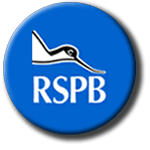RSPB
The Royal Society for the Protection of Birds
T
 he
RSPB is a charity dedicated to "developing
a public interest in wild birds and their place in nature". It owns more
than 120 reserves throughout the UK, including Scotland, and has many members
(now, apparently, more than a million!) who can be seen peering from hides throughout
the length and breadth of the land. Many RSPB reserves include habitats valuable
for species other than birds. The RSPB is also responsible for the RSPB Wildlife
Explorers (formerly called the Young Ornithologist's Club).
he
RSPB is a charity dedicated to "developing
a public interest in wild birds and their place in nature". It owns more
than 120 reserves throughout the UK, including Scotland, and has many members
(now, apparently, more than a million!) who can be seen peering from hides throughout
the length and breadth of the land. Many RSPB reserves include habitats valuable
for species other than birds. The RSPB is also responsible for the RSPB Wildlife
Explorers (formerly called the Young Ornithologist's Club).
The RSPB undertakes much research and development work concerning
birds world-wide, and has produced several publications which provide definitive
practical information for site managers, such as the Reedbed Handbook published
in 1996. Along with the BTCV practical handbooks these publications are considered by some to comprise the
canon of contemporary conservation practice.
practical handbooks these publications are considered by some to comprise the
canon of contemporary conservation practice.
At many reserves you will find little in the way of visitor
facilities, although there are usually hides and paths, and often some useful
information. However, a few key reserves are well provided for, such as Minsmere
in Suffolk, where there is an outstanding large visitor centre, many hides and
trails, and plenty of information. There are entry charges for most of the reserves,
although members can get in for free. Groups of ten or more should book in advance
with the site warden. Dogs are not usually allowed at all.
The RSPB was the last major UK conservation organisation to
go online in June, 1998.
The RSPB is the Birdlife
International partner in the UK.
If you call the RSPB number, ask to be put on hold for a bit. You will get the
most delightful 'bird sounds' instead of muzak. What a great idea!
Some of these have been taken from the RSPB official list
(RSPB Links), but, needless to say, Naturenet's list is even more comprehensive!
The RSPB Images homepage. Yes, its
official. No, you can't use them without paying. As if we would.

